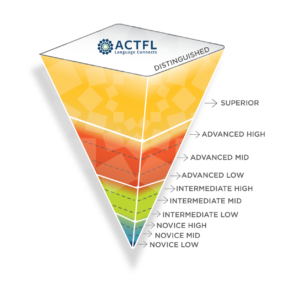
I am an Assistant Professor in the Department of Modern Languages and Literatures at John Jay College of Criminal Justice in New York City, a proud Hispanic-Serving Institution. I teach courses in interpreting, Spanish, and bilingualism. Most students at our college are bilingual, yet they often enter college unsure of how their language skills relate to their academic and professional goals.
私は、ニューヨーク市にあるジョン・ジェイ・カレッジ・オブ・クリミナル・ジャスティスの現代言語・文学科で助教授を務めています。当カレッジは、ヒスパニック系学生支援機関として認定されており、誇りに思っています。私は通訳、スペイン語、バイリンガリズムのコースを担当しています。当カレッジの学生のほとんどはバイリンガルですが、自分の語学スキルをどのように学業やキャリアの目標に結びつけたらよいか分からないまま入学してくることがよくあります。
At John Jay, our Translation and Interpreting Certificate program is designed to prepare students for real-world language careers—while also supporting their bilingual development. To evaluate whether this dual goal is being met, my colleague, Dr. Aída Martínez-Gómez, and I conducted a semester-long study using ACTFL’s Oral Proficiency Interview – Computer (OPIc)® in both English and Spanish. This allowed us to measure the functional oral proficiency of our students before and after one semester of coursework.
ジョン・ジェイ・カレッジの「翻訳・通訳資格プログラム」は、学生が語学関連の仕事に就けるよう準備を整えると同時に、バイリンガルとしての能力を伸ばすことを目的としています。この二つの目標が達成されているか評価するため、同僚のアイーダ・マルティネス=ゴメス博士と私は、ACTFLの「Oral Proficiency Interview – Computer (OPIc)®」を英語とスペイン語の両方で使い、1学期間にわたる調査を実施しました。これにより、1学期間の授業の前後で、学生たちの口頭での実践的な言語能力を測定することができました。
Bridging the Proficiency Gap(言語能力のギャップを埋める)
One of the key challenges in bilingual higher education is that students often have uneven language skills across English and Spanish. Many of our heritage Spanish speakers report feeling more confident in English, even though they use Spanish daily at home. At the beginning of our study, most participants were more proficient in English than in Spanish, according to their OPIc scores.
バイリンガルの高等教育における主要な課題の一つは、学生の英語とスペイン語の言語スキルに偏りがあることです。私たちの研究対象となったスペイン語継承話者の多くは、家では毎日スペイン語を使っていても、英語のほうがより自信があると報告しています。調査開始時のOPIcのスコアを見ると、ほとんどの参加者はスペイン語よりも英語のほうが、熟練度が高いという結果でした。
We hypothesized that instruction in Spanish—through the Translation I and Interpreting I courses—would help close this gap. Although the data showed that proficiency increased slightly in both languages after one semester of training, English showed a slightly stronger trend. Interestingly, those with lower starting proficiency (regardless of language) made the greatest gains. For details, you can access the 2025 article I co-authored with Aida Martínez-Gómez, Language Learning Bridge: How Translation and Interpreting Training Impacts Bilingual https://www.frontiersin.org/journals/education/articles/10.3389/feduc.2025.1609736/abstract.
私たちは、スペイン語で行われる「翻訳I」と「通訳I」の授業が、このギャップを埋めるのに役立つのではないかという仮説を立てました。データによると、1学期間のトレーニング後、両言語の習熟度はわずかに向上しましたが、英語の伸びがわずかに強い傾向が見られました。興味深いことに、初期の習熟度が低かった学生(言語を問わず)が最も大きく成長しました。詳細については、私がアイーダ・マルティネス=ゴメス博士と共著した2025年の論文「Language Learning Bridge: How Translation and Interpreting Training Impacts Bilingual」をご覧ください。 https://www.frontiersin.org/journals/education/articles/10.3389/feduc.2025.1609736/abstract
This supports what we have seen in language learning research (Gatti et al., 2024): students grow the most when they start from an intermediate level and are given structured, meaningful opportunities to use both languages. Seeing gains at the advanced level probably requires more than one semester of instruction. As ACTFL’s inverted pyramid demonstrates, it takes a long time and much input to move between sub-levels as one moves up the proficiency scale; see the diagram below.
この結果は、語学学習に関するこれまでの研究(Gatti et al., 2024)を裏付けるものです。学生は、中級レベルからスタートし、両言語を使いこなすための構造的で意味のある機会を与えられたときに最も大きく成長します。上級レベルでの習熟度向上には、1学期以上の指導が必要でしょう。ACTFLの「逆ピラミッド」が示すように、習熟度のスケールを上がっていくにつれて、サブレベル間を移行するには長い時間と多くのインプットが必要です。下の図をご覧ください。
Click here to access the ACTFL Proficiency Guidelines.
ACTFLの習熟度ガイドラインについては、こちらをクリックしてください。
LTI provides additional resources to implement the ACTFL Proficiency Scale. To read more, click here.
ACTFLの習熟度スケールを導入するための追加リソースは、LTIが提供しています。詳細を読むには、こちらをクリックしてください。

Inverted Pyramid Representing ACTFL Rating Scale with Major Ranges and Sublevels including Distinguished © 2024 ACTFL
From Language Brokering to Academic Skills(「言葉の仲介」からアカデミックなスキルへ)
Many of our students come into the program with informal interpreting experience—translating for parents at doctor’s appointments or helping family members with legal paperwork. These real-life experiences are invaluable but often unrecognized in traditional academic settings.
私たちのプログラムに参加する学生の多くは、親のために病院で通訳をしたり、家族の法的書類作成を手伝ったりといった、非公式な通訳経験を持っています。これらの実社会での経験は非常に貴重ですが、伝統的なアカデミックな場では認識されないことがよくあります。
In our classes, we aim to affirm and build on these skills. For example, students in our introduction to interpreting course practice bilingual communication in realistic scenarios, often drawing on their personal experiences. One student shared how interpreting for her family helped her feel confident during a mock immigration interview. By linking coursework to students’ lived experiences, we observed increased self-awareness, motivation, and participation.
私たちのクラスでは、これらのスキルを認め、その上にさらにスキルを築くことを目指しています。例えば、通訳入門コースでは、学生は現実的なシナリオでのバイリンガルコミュニケーションを練習し、個人的な経験を活かすこともよくあります。ある学生は、家族のために通訳した経験が、模擬の移民面接で自信を持つことにつながったと話してくれました。授業内容を学生の実生活と結びつけることで、自己認識、モチベーション、そして参加意識が高まる様子が見られました。
Unexpected Gains in English(英語力の予期せぬ伸び)
Although the courses are taught primarily in Spanish, we were surprised to see greater gains in English proficiency than in Spanish for some students. This speaks to the power of bilingual transfer. Translation and interpreting require students to think deeply in both languages, switching between them with precision and nuance. This cognitive exercise may reinforce metalinguistic skills that help students improve in both languages simultaneously.
授業は主にスペイン語で行われているにもかかわらず、一部の学生でスペイン語よりも英語の習熟度の方が大きく伸びたことは驚きでした。これは「バイリンガルの転移」の力を示唆しています。翻訳や通訳には、学生が両言語で深く思考し、正確かつニュアンス豊かに言語を切り替えることが求められます。この認知的な訓練は、学生が両言語で同時に上達するのを助ける「メタ言語スキル」を強化する可能性があります。
In the U.S., it is commonly believed that improving English proficiency requires more English instruction. However, our findings suggest that English can also improve through formal instruction in the heritage language. This aligns with bilingual education research showing that students in dual language programs often outperform their peers in monolingual or ESL settings on English reading assessments (Thomas & Collier, 2017), reinforcing the value of bilingual coursework for overall language development.
アメリカでは、英語力を向上させるには英語の授業を増やすべきだという考えが一般的です。しかし、私たちの研究結果は、継承言語での正式な指導を通じて、英語も向上する可能性を示唆しています。このことは、二言語併用プログラムの学生が、単一言語やESL環境の同級生よりも英語の読解力評価で優れた成績を収めることが多いというバイリンガル教育の研究(Thomas & Collier, 2017)と一致しており、総合的な言語能力の向上のために、バイリンガル向けの授業が、いかに価値のあるものかを補強するものです。
Conclusion and Reflection(結論と考察)
Our students gained more than just vocabulary or grammar—they developed real-world skills like critical thinking, adaptability, and confidence using both languages professionally. Some students reported that they now felt comfortable describing complex situations or hypothetical scenarios in Spanish for the first time. These are the kinds of language functions associated with ACTFL’s Superior level of proficiency.
学生たちは、単に語彙や文法を習得しただけでなく、批判的思考力、適応力、そして両言語をプロフェッショナルに使いこなす自信といった、実社会で役立つスキルを身につけました。複雑な状況や仮説的なシナリオをスペイン語で説明することに初めて抵抗がなくなったと報告する学生もいました。これらは、ACTFLの習熟度レベルで「Superior(上級)」に関連する言語機能です。
As educators, we have learned that translation and interpreting training is not just about job readiness — it is a powerful context for language development, especially for bilingual students navigating multiple linguistic and cultural worlds. This work has inspired us to further tailor our instruction to heritage learners, integrating their unique linguistic backgrounds more intentionally into the curriculum.
教育者として私たちが学んだのは、翻訳・通訳トレーニングは単なる就職準備ではないということです。複数の言語と文化の世界を行き来するバイリンガルの学生にとって、言語能力を伸ばすための強力な場となるのです。この研究をきっかけに、私たちは継承話者向けの指導をさらに調整し、彼らのユニークな言語的背景をカリキュラムに意図的に組み込むことにしました。
Working with ACTFL’s OPIc has proven to be both a practical and pedagogically sound choice. We selected the OPIc because it allows for flexible, simultaneous administration with a group of students—an essential feature for classroom-based research. Unlike many traditional proficiency assessments, which often rely on metalinguistic knowledge and can disadvantage heritage learners, the OPIc has been validated as an effective tool for assessing both L2 and heritage speakers. Beyond its research utility, the OPIc also offers students a concrete way to track their own language development over time. Several students expressed pride in seeing their scores improve, which helped build confidence and reinforced their sense of progress in the course. This study is part of a broader research initiative supported by CILC, one of the Language Resource Centers funded by the U.S. Department of Education, which aims to advance innovative approaches to language education in higher education.
ACTFLのOPIcは、実践的かつ教育学的に優れた選択肢であることが証明されました。私たちがOPIcを選んだのは、グループの学生に柔軟かつ同時に実施できるという点です。これは教室ベースの研究に不可欠な特徴です。多くの伝統的な習熟度評価は、メタ言語的な知識に依存し、継承話者には不利に働くことがありますが、OPIcは第二言語話者と継承話者の両方を評価する効果的なツールとして妥当性が検証されています。研究での有用性だけでなく、OPIcは学生が自身の言語能力の伸びを時系列で追跡するための具体的な方法も提供します。複数の学生が、スコアが向上したことを見て誇りを感じ、それが自信につながり、コースでの進歩を実感するのに役立ったと語ってくれました。この研究は、米国教育省が資金提供するLanguage Resource Centersの一つであるCILCの支援を受けた、高等教育における言語教育の革新的なアプローチを推進するための広範な研究イニシアティブの一環です。



